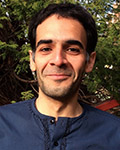2017
Nabeel Hamid
- Doctoral Candidate
- University of Pennsylvania

Abstract
This project argues that the reception of the mechanical worldview in the German Enlightenment was deeply conditioned by the metaphysics of late-medieval scholasticism. Linking seventeenth-century Lutheran scholastics such as Christoph Scheibler and Johann Clauberg and eighteenth-century thinkers like Christian Wolff and Immanuel Kant, it shows how pressure from the new mathematical physics led authors in this tradition to reconfigure rather than abandon Aristotelian models of causal explanation. By Kant’s time, accordingly, theories of causation accommodate the explanatory needs of mechanistic physics within a broadly Aristotelian view of causes as agents and nature as a goal-directed principle of change. Mediating this transformation is the preservation in early modern Germany of two scholastic theses bearing on natural teleology: the denial of a distinction between being and the good, between facts and values—sometimes called the convertibility thesis; and, second, the view that explanations involving ends or purposes presuppose rational agency.

